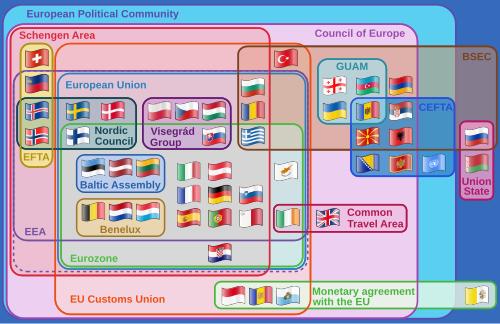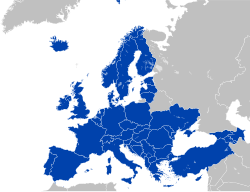Top Qs
Timeline
Chat
Perspective
European Political Community
International diplomatic meeting From Wikipedia, the free encyclopedia
Remove ads
The European Political Community (EPC) is an intergovernmental forum for political and strategic discussions about the future of Europe, established in 2022 after the Russian invasion of Ukraine.[1][2] The group first met in October 2022 in Prague, with participants from 44 European countries, as well as the Presidents of the European Council and the European Commission.[3] It is distinct from both the European Union (which is a participant) and the Council of Europe (represented by its Secretary General). The 47 EPC participating states are home to 689.5 million people, constitute 8.7 percent of the world's population and represent about 23.5 percent of the global GDP.[4]
Remove ads
History
The European Political Community was proposed by the French president Emmanuel Macron at the Conference on the Future of Europe on 9 May 2022 after the Russian invasion of Ukraine,[5] in his role as the president of the Council of the European Union (EU). The President of the European Council, Charles Michel, also put forward a similar proposal for the establishment of a "European geopolitical community".[6] On 23–24 June 2022, formation of the community was agreed to at a meeting of the European Council.[7][8] On 29 September 2022, the United Kingdom announced that it would participate in the community.[9] The group convened for the first time on 6 October 2022 with leaders from 44 states in attendance. Russia and Belarus were deliberately excluded from participation.[10] In January 2023, it was confirmed that San Marino had joined the community becoming its 45th participating state.[11][12] The heads of government of Andorra and Monaco were also invited to the second summit bringing the number of participants up to 47.[13][14]
Remove ads
Aim
Summarize
Perspective
In his address to the European Parliament on 9 May 2022, French President Emmanuel Macron proposed the European Political Community as "a new European organization" that would allow countries "that subscribe to our shared core values to find a new space for cooperation" on politics, security, energy, infrastructure, investment, and migration.[15]
The aim of the European Political Community is to provide a policy coordination platform for European countries across the continent and to foster political dialogue and cooperation to address issues of common interest, so as to strengthen the security, stability and prosperity of the European continent,[8] in particular in regard to the European energy crisis.[16][17]
The European Political Community aims at:[18]
- strengthening the links between EU member states and non-EU member states who share the same European values,
- increasing cooperation between the member countries on a large scale of topics, such as peace, security, energy, climate, migration and the current economic situation,
- allowing candidate states to start taking part in some European projects, such as student and university exchanges.
Following a bilateral summit meeting between the leaders of the United Kingdom and France on 10 March 2023, it was stated in the joint declaration that the EPC should focus on energy, infrastructures, connectivity, cybersecurity, countering disinformation and migration.[19][20]
Remove ads
Structure
Summarize
Perspective
The European Political Community is envisaged as an intergovernmental forum for heads of states and governments similar to the G7 or G20 and upon establishment did not have its own secretariat, budget or staff.[21] Each summit is primarily organised by the hosting country.[1] Initially, the incoming host, outgoing host and future host constituted a hosting trio to coordinate organising summits and the setting agendas.[22][23][24] This was expanded to a quartet following the fourth summit in July 2024.[25]
In January 2023, the Government of France began recruiting a small task force, led by a project manager, to support the work of the EPC. The task force will help coordinate the preparation and organisation of EPC Summits, support the institutional development of the EPC, facilitate the insertion of the EPC in the space European diplomacy (EU, Council of Europe) and contribute to mobilising various other actors (such as development banks) in support of the work of the EPC.[26]
The invitation letter for the first summit was signed by European Council President Charles Michel.[27] For the second summit, invitation letters were jointly signed by Charles Michel and Maia Sandu, the president of the hosting country.[28]
As the community has not launched an official website, the agendas, press releases and multimedia resources for the summits are published on the website of the European Council.[29][30]
Symbols

A wordmark consisting of the English language name of the community in blue capital letters has been used since the first summit in October 2022.[31] A logo consisting of the abbreviation "EPC" in blue on a white background was introduced in the lead up to the second summit.[32]
As a condition for the United Kingdom's participation, Liz Truss during her brief tenure as prime minister insisted that the European Political Community should not use symbols associated with the European Union such as the European Flag or the European Anthem.[33][34][35][36]
Remove ads
Summits
Summarize
Perspective


Two summits are held every year with the spring summit being hosted by a non-EU member state and the autumn summit hosted by an EU member state.[1][37] The autumn summit is held in the country assuming the presidency of the Council of the European Union during that semester.
The first summit took place in Prague on 6 October 2022.[38] The event was covered live by the Eurovision network.[39]
Following the first summit, it was decided that Moldova would hold the following meeting, and topics on which leaders agreed to work on include protecting "key facilities", such as pipelines, undersea cables, and satellites. It was also agreed that the next two summits would take place in Spain and in the United Kingdom.[10][40]
In May 2023, Switzerland expressed an interest in hosting an EPC summit in spring 2025.[41] Serbia has also expressed an interest in hosting a future summit.[42] During the closing press conference of the 4th summit, the British prime minister, Keir Starmer, confirmed that the next summit will take place in Hungary followed by summits in Albania and Denmark in 2025.[43] In May 2025, it was announced that the EPC spring summits would be hosted by Armenia in 2026,[44] Switzerland in 2027,[45] and Azerbaijan in 2028,[46] and that the autumn summits would be hosted by the Republic of Ireland in 2026, Greece in 2027 and Latvia in 2028.[47]
Remove ads
Participants
Summarize
Perspective

An Euler diagram showing the relationships between various multinational European organisations and agreements
The countries and international organisations participating in the European Political Community are as follows:[1][61][32]
- Countries participating
 Albania
Albania Andorra
Andorra Armenia
Armenia Austria
Austria Azerbaijan
Azerbaijan Belgium
Belgium Bosnia and Herzegovina
Bosnia and Herzegovina Bulgaria
Bulgaria Croatia
Croatia Cyprus[a]
Cyprus[a] Czech Republic
Czech Republic Denmark
Denmark Estonia
Estonia Finland
Finland France
France Georgia
Georgia Germany
Germany Greece
Greece Hungary
Hungary Iceland
Iceland Ireland
Ireland Italy
Italy Kosovo[a]
Kosovo[a] Latvia
Latvia Liechtenstein
Liechtenstein Lithuania
Lithuania Luxembourg
Luxembourg Malta
Malta Moldova
Moldova Monaco
Monaco Montenegro
Montenegro Netherlands
Netherlands North Macedonia
North Macedonia Norway
Norway Poland
Poland Portugal
Portugal Romania
Romania San Marino
San Marino Serbia
Serbia Slovakia
Slovakia Slovenia
Slovenia Spain
Spain Sweden
Sweden Switzerland
Switzerland Turkey
Turkey Ukraine
Ukraine United Kingdom
United Kingdom
- Organisations participating
 Council of Europe
Council of Europe European Union
European Union ∟ European Council
∟ European Council ∟ European Commission
∟ European Commission ∟ European Parliament
∟ European Parliament NATO
NATO OSCE
OSCE
- European overseas territories participating
- European governments in exile participating
- European countries not participating
- European countries not invited
Remove ads
Achievements
During the first summit, it was agreed that a European Union-led mission would be deployed on the Armenian side of the border with Azerbaijan for a period of two months of monitoring following the Armenia–Azerbaijan border crisis.[62] This mission ultimately led to the deployment of a longer term European Union Mission in Armenia.
The first summit also led to a rapprochement between the United Kingdom and European institutions.[63] At the summit, the UK agreed to re-engage with the North Seas Energy Cooperation (NSEC)[64][65][66] and committed to joining the Permanent Structured Cooperation (PESCO) and its Military Mobility programme.[67][68][69]
The second summit hosted by Moldova coincided with an €87m contribution to non-military logistical aid from the European Peace Facility, as well as the establishment of a civilian mission in Chișinău.[70][71]
Remove ads
Reception
Summarize
Perspective
Positive
German Chancellor, Olaf Scholz said that community could mediate "regular exchanges at the political level" once or twice a year to discuss issues affecting the continent.[72] Prime Minister of Albania, Edi Rama, and Prime Minister of the Netherlands, Mark Rutte, supported Macron's proposal in an opinion piece published by Politico on 5 October 2022. They argued that Europe needed a platform that did not overlap with existing regional organisations or displace processes of European Union membership.[73] In a command paper presented to parliament in March 2023, the UK government stated that it supports the aims of the EPC and sees it as a "notable and welcome new forum for continent-wide cooperation".[74] The Consultative Committee of the European Economic Area welcomed the formation of the EPC and considers it to be a good arena for the discussion of talks and discussions related to maintaining peace and stability across the continent.[75]
Negative
According to the Associated Press, critics claimed the EPC was an attempt to put the brakes on the potential enlargement of the European Union, speculating that "it may become a talking shop, perhaps convening once or twice a year but devoid of any real clout or content". Additionally, the first summit did not include a formal declaration, nor was any offer of EU money or programs proposed at the time. A spokesperson for the Council of Europe, in response to the summit, stated, "In the field of human rights, democracy and the rule of law, such a pan-European community already exists: it is the Council of Europe."[10] However, in July 2024, the Secretary General of the Council of Europe, Marija Pejčinović Burić, did attend the 4th European Political Community Summit in the United Kingdom.[76] Russia criticised the EPC as "yet another attempt by Brussels to build an anti-Russian coalition and prevail upon other countries to join the campaign of sanctions against Russia."[77]
Remove ads
See also
Notes
- Country is not recognised by every participant.
References
External links
Wikiwand - on
Seamless Wikipedia browsing. On steroids.
Remove ads


